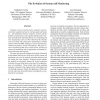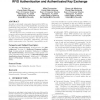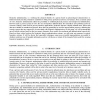382 search results - page 47 / 77 » k-Anonymity: A Model for Protecting Privacy |
ACSAC
2008
IEEE
14 years 2 months ago
2008
IEEE
Computer security systems protect computers and networks from unauthorized use by external agents and insiders. The similarities between computer security and the problem of prote...
CCS
2007
ACM
14 years 1 months ago
2007
ACM
Recently, a universally composable framework for RFID authentication protocols providing availability, anonymity, and authenticity was proposed. In this paper we extend that frame...
SSWMC
2004
13 years 9 months ago
2004
Biometric authentication, i.e. verifying the claimed identity of a person based on physiological characteristics or behavioral traits, has the potential to contribute to both priv...
PROVSEC
2009
Springer
14 years 2 months ago
2009
Springer
Private inference control enables simultaneous enforcement of inference control and protection of users’ query privacy. Private inference control is a useful tool for database ap...
CCS
2004
ACM
14 years 1 months ago
2004
ACM
Comparing the expressive power of access control models is recognized as a fundamental problem in computer security. Such comparisons are generally based on simulations between di...



